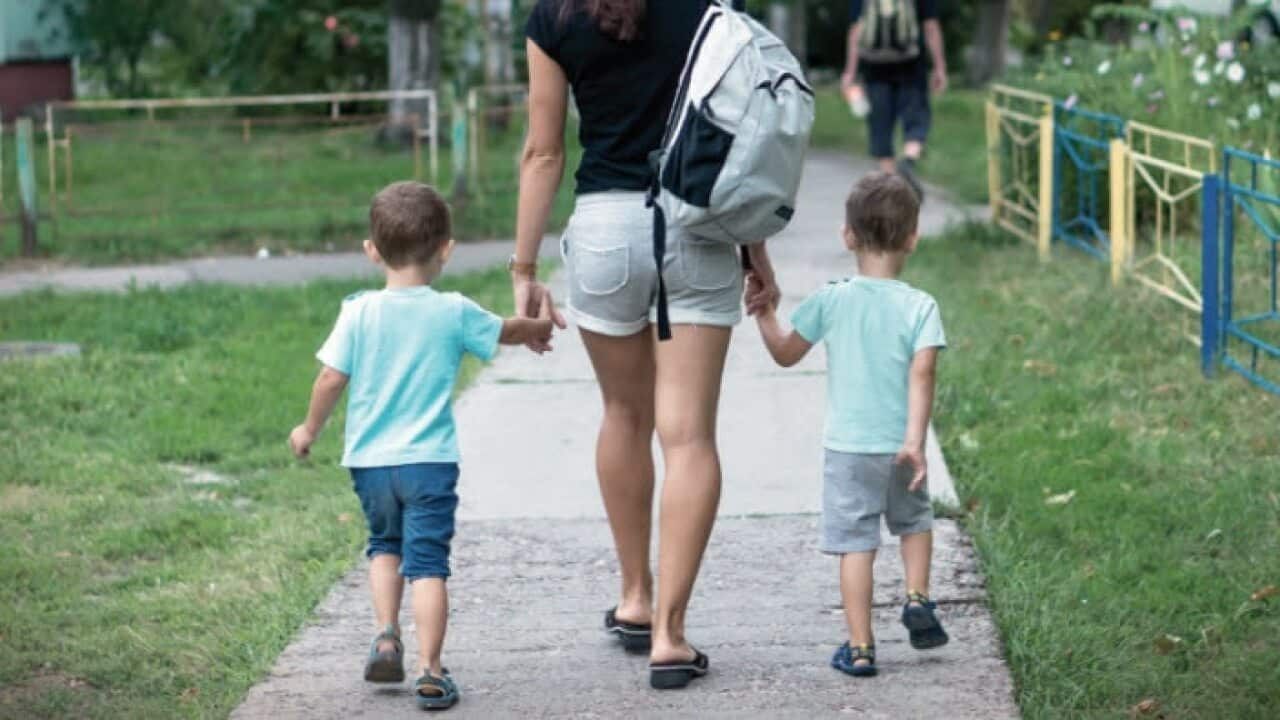Highlights:
- Au pairs working in Australia say they have been forced to work long hours and deal with more housework than was specified in original agreements.
- Some au pairs are fearful of losing visas if they speak out about abuse from their employing families.
- The Fair Work Ombudsman offers support and advice in 30 languages for au pairs dealing with exploitative work situations.
Claudia*, an au pair working in Australia, claims she was verbally abused by her employer, who worked for the Australian police, something that, in Claudia's own words, “...made her feel at a situation of total disadvantage and extreme vulnerability”.
“I once went to see a concert at a friend's house and arrived home a little later than [usual]. She started shouting horrible [things] at me and told me to leave,” Claudia told SBS Spanish.
Claudia admitted that she was very surprised by her employer's behaviour because she considered that she was doing a good job as an au pair and had never arrived home late prior to that.
I thought that lady was going to hit me, because she was yelling at me super close. It was so terrible the way she treated me, everything she told me and to be kicked out of the house like that... leaving me with nowhere to sleep that night. It was very difficult for me. I couldn't believe it.
However, she said she didn't report the abuse to the authorities.
“[Because of the type of] work that person did, I know that she had everything to lose,” she said.
“If that lady had hit me, if that lady had done something to me, or if that lady had wanted to say anything about me... who are they going to believe? Me or her? If that lady had put her hand on me, I couldn't prove that I wasn't the one who caused the problem."
In Claudia's case, when the incident occurred, she says she didn't know what to do or where to go to report her situation, so she went to the welfare department of the institution where she was studying.
But, according to Claudia, they only listened to her, without offering any firm directives.
Claudia says that the voice of an au pair is not always heard, and, that in many cases, the problems they face are dismissed as “...simple cultural shocks”.
For this reason, Claudia pointed out that many young women did not seek help from the agencies where they registered as au pairs because they feared that this could cause them more problems than solutions and jeopardise the relationship with the families that employed them.
“There is no protection of any kind for au pairs. Always, always, always [they will favour] the family. In other words, you always have everything to lose. It's difficult for the agency to protect you,” she said.
According to Claudia, many au pairs stayed silent when their responsibilities, workload, working hours and even abuse by the families that employed them increased.
Abuse that sometimes, according to interviewees, could be on the verge of domestic slavery or be nuanced by verbal and physical violence.
Deprived of freedom, privacy, say Mexican au pairs
on a Australian Au Pair Cultural Association (CAPAA) study that details that its members “...often hear horror stories from both au pairs and families, and that most complaints come from arrangements that are achieved through online search engines, agencies abroad or agencies that are not affiliated with CAPAA.”
SBS Spanish spoke to a Mexican couple, on the condition of anonymity, about their experiences while working as au pairs.
They explained that after losing their jobs in 2020 as a result of the business downturn caused by the COVID-19 pandemic, they decided to work as au pairs to make ends meet.

Working as an au pair can place temporary visa holders in vulnerable situations. Source: Getty / Getty Images
The couple added that they felt deprived of both freedom and privacy, and claim that the host family even controlled what they ate.
'Dark realities of working as an au pair'
Immigration agent, Juan Rincón, told SBS Spanish that, although programs to work as an au pair in Australia present themselves as attractive opportunities for both parties, in certain circumstances they can also hide very "...dark realities".
According to Mr Rincón, the proliferation of platforms on the Internet, where the reliability of profiles are not monitored, and the reality that the work is done “in a private home”, where there are no inspections by any authority, increase the vulnerability of au pairs.
For this reason, Mr Rincón emphasised the importance of staying informed about labour rights in Australia.
What do we recommend? That although it is domestic work, the work is not exempt from any of the labour regulations in Australia: minimum wage, holidays, superannuation... all of those rules still apply.
Mr Rincón pointed out that it is very important that the person who is working as an au pair realises that they are entitled to these benefits, and from the outset, makes it clear to their employer that, “...this is a job and we have to treat it like a job.”
According to a 2018 study of 1,500 au pairs from 34 nationalities entitled “the “cultural exchange” that the au pairs had anticipated often did not meet their expectations.
Conducted by University of Technology of Sydney academic, Laurie Berg, and Macquarie University Professor of Sociology, Gabrielle Meagher, the study found that au pairs were assigned more household chores than they had expected and worked longer hours than they had been promised.
In addition, the study found that one in six au pairs reported feeling forced to stay with families because they had nowhere else to go.
The survey also revealed that 60 per cent of the interviewees were working around 36 hours a week and not only taking care of the children, but also cooking, cleaning and doing other household tasks.
Affordable childcare in exchange for food, board
'Au pair', 'nanny', and 'babysitter' are some of the terms entered into job search platforms by mostly young women who arrive in Australia on temporary visas.
Au pairs are usually student visa holders and must perform some household chores in addition to their main role of caring for children.
The French translation of 'au pair' means 'on a par' or 'equal to' since employing families offer the person accommodation, food and 'a wage subsidy' in exchange for their services.
To calculate the wage subsidy, the Australian government recommends that families use the national minimum wage, which stands at $21.38 per hour, minus the average cost of room and board.
Agencies with au pair job listings promote the benefits of the employment agreement for both international visitors and Australian families.
For people with temporary visas seeking job stability, cultural orientation and an opportunity to improve their English, this arrangement can seem very attractive.
A spokesperson from Australian agency, Smart Au Pairs, told SBS Spanish that the program “...provides opportunities for young people with limited work experience through safe work with a welcoming family that also provides housing.”

Source: Supplied
'I felt a part of the family'
With those incentives in mind, Paty Guerra, a young Peruvian woman who arrived in Australia in 2019, sought out an Australian family.
Although there are agencies in Australia that, in exchange for a subscription, assist both au pairs looking for work and families who need their services, Ms Guerra says she chose to search for a family on social networks, a practice that, according to her, has become the most common way to find au pair positions.
Working as an au pair allowed her to have a room with a private bathroom, food and a tax-free allowance of $300 a week, she said.
“[It was an arrangement] that suited them, but it also suited me... My intention in coming to Australia was not to spend money, but to really enjoy my migratory experience," she said.
“So, I didn't worry so much about the economic issue... I just wanted to cover my expenses, work a little, and the rest of the time be free so I could go and meet people, go to parties...”
She described her experience as an au pair in Australia as being very positive, in particular because the relationship with the family that hosted her “...was very good”.
Her enthusiasm was echoed by Diana Rojas, a Colombian au pair who assured SBS Spanish that the job provided her with an opportunity to feel a part of a family despite being so far away from her loved ones.
The families were very sympathetic to me when it came to studying. The time to study and the time to work were fully established. I had very good experiences.Diana Rojas, Colombian au pair based in Australia.
Lack of regulation is 'concerning' says peak body
But it seems not all au pairs are as lucky as Ms Rojas or Ms Guerra.
recently expressed “...concern about the lack of regulation in the recruitment and selection of au pairs and host families.”
Hiring an au pair in Australia can be arranged informally or through an agency.
Some agencies evaluate the au pair and the family before finalising an agreement, but currently there is no official or consistent process, according to the CAPAA.
The body added that some agencies reviewed family history through a police authorisation check and requested proof of qualifications or experience from au pairs, but “...agencies vary greatly in their selection processes and level of support during the process.”
This lack of regulation and consistency in the process drives many young people to use social networks to find au pair jobs.
Finding a position this way often means there are no legal contracts or written agreements that establish the number of hours, the pay and the working conditions of an au pair who takes care of the children and performs domestic tasks in exchange for shelter, food and a basic wage.
The office of the in Australia states on its website that in order to consider a nanny or au pair an employee, the agreement that has been established with the family must be reviewed individually.

Working as an au pair allows free time to get to know a new country and meet friends. Source: SBS
Fear of losing visas if they complain
Among the most common dilemmas faced by people who work as au pairs in Australia is the thought that if they complain, they might run the risk of losing their visas or having some other legal issue with the Department of Immigration.
In his experience as an immigration agent, Mr Rincón says that many people put up with abuse because they think that otherwise they will be reported to the authorities.
“[They fear] that they will be taken out of the country... [because they have] worked longer than the approved time," he said.
“[They think] 'I'm the one who's making the mistake, it's going to be worse for me to file the complaint than what I'm going to win'.
“But no, don't be afraid - there is a clear position of the Fair Work Ombudsman where a person who complains will not have their visa affected."
The Office of the Fair Work Ombudsman told SBS Spanish that au pairs who needed advice about their specific situations could have, or call the information line on 13 13 94 or the free interpretation service on 13 14 50.
In its statement, the Ombudsman said that the exploitation of any worker was not tolerated in Australia, regardless of their citizenship or immigration status, and assured that issues involving visa holders would also be prioritised.
The information and resources offered by the Fair Work Ombudsman office are available in more than 30 languages, including Spanish. Those who do not want to be identified can report anonymously, and the Ombudsman guarantees that visa holders with labour rights can seek assistance without fear that their immigration status will be affected.
The Fair Work Ombudsman added that any worker in fear for their safety should go immediately to a police station where they would be able to receive help.
Mental health impacts
Mexican-born psychologist, Jesica Lule, now based in Brisbane, said that a situation of workplace abuse, work overload, verbal, physical or extreme control violence could have a serious impact on the mental health of a person who is alone in a new country.
“I've had people approach me precisely with these kinds of problems. They are coping with this situation and it's not pleasant at all,” the psychologist explained.
And of course they don't know what to do, they don't know how to complain, they don't know if they have the same rights, they don't realise that they are living in a situation of violence but it is violence. Even if there are no blows, it's violence. In the end, it's abuse.Jesica Lule, Mexican psychologist based in Brisbane
The specialist also explained that the stress, anxiety and depression caused by exposure to long working hours, the abuse of power, psychological harassment and the social or cultural isolation that these young people may experience are factors that impact both their mental and emotional health.
“This affects precisely eating disorders, levels of generalised anxiety, hopelessness, suicidal ideation. This should be treated as a traumatic situation, because it generates a high level of stress, because it was an unpleasant situation. So this generates trauma and that's how it should be treated,” she said.
*Fictitious name to protect the identity of the interviewee.
To listen to the full report, press the play button below the title of this article.






